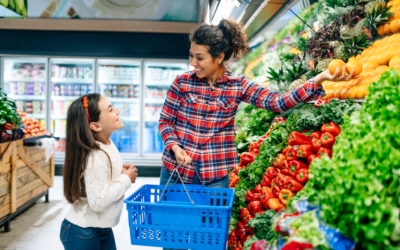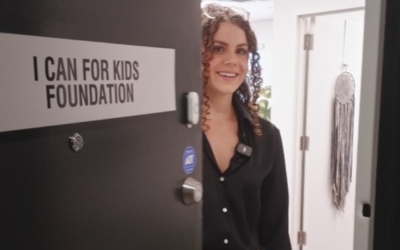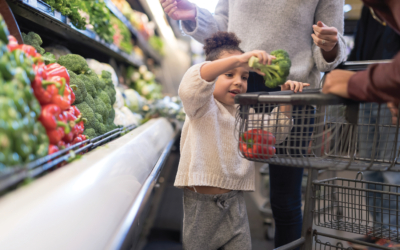
I Can for Kids (iCAN) has partnered with Carya for ten years to reach food-insecure families across Calgary. Carya is a social impact agency who has responded to the evolving social needs of the city since 1910. They offer comprehensive, low and no-cost programs and services that enhance mental well-being, strengthen families, improve living conditions, and create meaningful social connections.
iCAN sat down with Andrea, a Registered Psychologist and Family Counsellor who targeted our grocery gift cards during her employment at Carya. But before she discussed her insights into the impact of our program, Andrea spontaneously shared her own personal journey with food insecurity. We chose to publish her powerful story to amplify the voices and experiences of food-insecure families. In this blog, Andrea describes the influence of our program on the dynamics between agency staff and grocery gift card recipients and the benefits our model offers to both recipients and agency partners.
Please describe the path you follow to identify those families who experience significant food insecurity and could benefit from the support of a grocery gift card.
I first notice a sense of financial strain during the intake process when a family requests a subsidy to access any of our paid services. When exploring the reasons that a client wishes to access counselling services or supports to address symptoms of anxiety, depression, or stress, I often find that most issues are linked to a serious lack of basic needs, such as income, food, and other essentials.
How does the I Can for Kids grocery gift card program impact your relationship with your clients?
The grocery gift card model builds trust. When I can offer immediate support to a family to help manage or reduce stress, the client feels heard and understood. Many low-income families have experienced condescending tones from the public where they sometimes hear comments such as: “if you were better at budgeting, you wouldn’t be in this situation.” The reality is that our income support system hasn’t increased the amount of money people receive despite the obvious impacts of intense inflation over the past several years, continually increasing expenses for everyone.
In addition, the grocery gift cards are truly ‘free’ for our clients. Many people don’t realize that financial assistance programs come with a cost to access them. Individuals relying on these supports must put a lot of time and effort into a bureaucratic system that is very difficult to navigate. There are lots of rules and requirements to access services that may not align with a parent’s work schedule or childcare, such as needing to show up at specific locations at specific times to get help. Navigating all these requirements wears people down. Those with enough money have the privilege of meeting their needs without investing onerous amounts of time and energy. I think we all take this for granted. The I Can for Kids program lifts people up because they don’t have to drain their fuel tank before they can benefit.
How does the I Can for Kids program help your clients with their mental health?
Even though I’m not able to change or improve many outside factors, I can help alleviate some of the major stress clients face on a day-to-day basis with the iCAN grocery gift cards. If we, as a society, worked to reduce or eliminate poverty, I believe we would see a reduction in mental health problems. Food security is instrumental to people’s mental health, and the ability to access food is directly related to income. It’s a mistake that we attempt to address mental health separately from physical and financial health. While I provide an opportunity for clients to improve their wellbeing, I also consider how their finances and access to resources impacts their mental health. Grocery gift cards offer a quick response to shift emotional stress so clients can pay attention to other pressing matters.
How well does the grocery gift card program enable your agency to respond to urgent family needs?
The grocery gift cards provide some ease to families, which creates space for clients to learn new skills, and engage in their mental health journey. I support clients with many intersecting concerns and find that without acknowledging the larger picture, there is a risk of further marginalizing or harming people. For example, anxiety is a natural response to not having enough food, without addressing the larger systemic issues of inadequate income for families, it is difficult for families to see long-term change.
An example of an urgent need would be a youth who is kicked out of their house for their sexual orientation. That youth will likely feel depressed and highly anxious, for good reasons! Grocery gift cards provide for an immediate and life-threatening need which allows that youth to redirect any income support they have to pay for medications, transportation, and school supplies and to contribute to the household they might be staying at.
In your experience, how does the grocery gift card program compare to traditional food programs in meeting your agency’s needs and your client’s needs?
I prefer the iCAN program because I have access to grocery gift cards on the day the client is coming in to see me. They don’t need to make an extra trip and they always access Carya services at the location that is most convenient for them. I have received extremely positive feedback from families who have accessed iCAN’s program. They are all very grateful to receive support that allows them to make purchases that work for their family, such as culturally sensitive foods or foods specific to a medical diet. Families can purchase the foods their children will eat, and it offers more choice and flexibility for them to use their budget to cover bills, rent, and medications.
I do at times provide information on food hamper programs in the city, but I have limited capacity to support families in accessing a food hamper. I am not able to pick up hampers for them or provide transportation to and from program locations.
How does participation in the grocery gift card program affect workload for staff at your agency compared to working with a food program?
I appreciate the simplicity of the referral process for I Can for Kids, and the flexibility that it allows to consider the many contextual factors impacting a family at a given moment in time. My experience of food hamper programs is that there is often additional paperwork to complete. This is a bureaucratic burden for clients. In addition, many food hamper programs require clients to prove their income, which can be shaming and overlooks the context that created hardship for a family. Income is just a number, whereas a client’s unique story fills in all the details of their struggle.
Many thanks to our amazing partners!
Our enduring partnership with Carya exemplifies our innovative approach and response to food insecurity in Alberta. This valued collaboration showcases the synergy and power of community organizations who work together to create meaningful change in the lives of vulnerable kids and families. iCAN would like to extend a huge note of gratitude to Andrea and everyone at Carya who boosts the future and well-being of so many children and households in our communities.
When you donate today, you enable iCAN to amplify our program and reach a greater number of food-insecure children and families across Alberta who also need support for a range of other complex life challenges.
To join iCAN’s expanding list of donors, sponsors, and champions, check out the different ways you can get involved or donate. To stay updated on our work, please subscribe to our monthly newsletter.
About I Can for Kids Foundation
I Can for Kids works closely with multiple agency partners to target and distribute grocery gift cards to food-insecure families who are most in need. The iCAN grocery gift card program is a more dignified and inclusive approach to dealing with food insecurity, allowing families to shop where everyone else shops and to choose foods that are appropriate for their health and cultural needs. Explore their website to discover more about iCAN’s impact over the years.
For more information and media inquiries, please contact iCAN Executive Director, Bobbi Turko at bobbi@icanforkids.ca.




